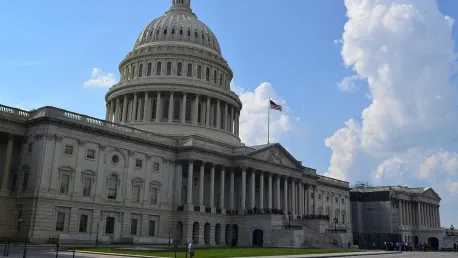Aaron Weis’s current role and recent insights reflect his tireless advocacy for zero trust principles in cybersecurity. His journey from CIO of the Department of the Navy to managing director of technology at Google Public Sector positions him as a leader in modernizing government infrastructure and employing advanced security measures. Weis’s extensive background and rich experience enable him to bring a fresh perspective to governmental cybersecurity, especially in the realm of zero trust principles. Exploring his efforts reveals how these principles can transform outdated systems into robust, secure environments capable of withstanding modern cyber threats.
Transition from Government to Google Public Sector
Aaron Weis’s transition from a senior advisor role at the Department of Defense (DOD) to CIO of the Department of the Navy, and now to a pivotal position at Google Public Sector, underscores the breadth of his expertise. Throughout his career, Weis has overseen significant technology budgets and spearheaded innovation in both governmental and private sectors, imparting valuable insights into the evolving cyber landscape. This extensive background enables him to tackle complex cybersecurity challenges with adeptness, leveraging his unique understanding to foster better-secured operations.
Weis’s journey from DOD to Google Public Sector wasn’t merely a change in titles; it was a pivotal evolution that brought with it a profound perspective. His time in governmental roles exposed him to the inherent vulnerabilities and bureaucratic hurdles faced by critical infrastructure. This experience motivated Weis to champion modernization, advocating for advanced security measures and innovative strategies. As a result, he now leverages his knowledge to drive impactful changes within Google Public Sector, demonstrating a steadfast commitment to enhancing cybersecurity standards.
Advocacy for Zero Trust Principles
Weis’s unwavering advocacy for zero trust principles stands as a cornerstone of his work. The zero trust model, a cybersecurity framework pioneered by Google in the aftermath of the Project Aurora attacks in 2009, seeks to redefine traditional security measures. At its core, this framework emphasizes rigorous validation at every level—user, device, application, network, and data—to ensure a resilient security posture. Through his advocacy, Weis has highlighted the profound impact Google’s heavy investment in zero trust has had, effectively protecting its network from subsequent cyber threats and presenting a blueprint for the DOD.
Implementing zero trust principles within sprawling government IT ecosystems presents unique challenges, as Weis frequently underscores. One of the most pressing issues is the widespread reliance on outdated legacy infrastructure. Despite notable strides in cloud technology, a significant percentage of U.S. government infrastructure, particularly within the DOD, remains rooted in antiquated systems. This heavy dependence on legacy systems not only hampers technological progress but also creates exploitable vulnerabilities due to outdated patches and security measures, necessitating a comprehensive overhaul.
Modernizing Government Infrastructure
To address these pervasive threats, Weis champions a robust modernization of government infrastructure. He articulates the critical need for transitioning from traditional on-premises data centers to more secure, adaptable cloud environments. This shift is indispensable for realizing the full potential of zero trust principles, as it enables dynamic, scalable solutions capable of countering sophisticated cyber threats. Weis’s reflections on the Department of the Navy and broader DOD infrastructure highlight the magnitude and complexity of such an undertaking, stressing the urgency for immediate and sustained modernization efforts.
Within his role at Google, Weis spearheads collaborations with high-security government agencies to pioneer innovative projects. A notable example includes red teaming activities that rigorously test and validate zero trust controls. This hands-on, practical approach not only affirms the effectiveness of zero trust in real-world scenarios but also provides compelling evidence to foster broader adoption across governmental entities. By actively engaging in these efforts, Weis demonstrates a commitment to advancing robust cybersecurity measures within the public sector.
Shifting to Integrated Commercial Cloud Infrastructures
One key initiative under Weis’s leadership involves migrating government agencies from isolated “gov clouds” to more integrated commercial cloud infrastructures. Initially, gov clouds were seen as bespoke solutions providing tailored security; however, they have notably lagged in feature updates and essential patching, thereby presenting significant risks. Weis argues that by integrating into the extensive, secure frameworks of commercial clouds, government agencies can harness advanced security features and keep pace with rapid technological advancements, thereby mitigating emerging cyber threats.
Weis’s role in shaping Google’s DOD strategy exemplifies his dual acumen as a former DOD insider and a technology leader. This unique vantage point enables him to align Google’s offerings with the specific needs and operational intricacies of governmental bodies. Google aims to deliver ecosystem-wide solutions that provide planet-scale capabilities, essential for the DOD’s expansive mission. Weis’s strategy underscores an understanding that melding advanced technology with in-depth governmental insights is pivotal for addressing contemporary cybersecurity challenges comprehensively.
Strategic Shift from Product-Centric to Solution-Centric Approach
Aaron Weis’s current role and recent insights highlight his dedicated advocacy for zero trust principles in the realm of cybersecurity. His transition from the CIO of the Department of the Navy to the managing director of technology at Google Public Sector underscores his influence in advancing government infrastructure and implementing cutting-edge security measures.
With a robust background and extensive experience, Weis is well-positioned to infuse fresh perspectives into governmental cybersecurity, particularly through the lens of zero trust principles. These principles are critical as they assume no entity, whether inside or outside the network, can be trusted by default. Every access request must be verified, reducing vulnerabilities and mitigating risks.
Weis’s work is particularly significant as it addresses the pressing need to modernize outdated systems, transforming them into secure environments capable of withstanding contemporary cyber threats. This proactive approach is essential for safeguarding sensitive government data and ensuring the integrity of national security operations.
Exploring Weis’s efforts reveals the transformational potential of zero trust principles in creating resilient cybersecurity frameworks. By prioritizing verification and minimizing trust, these measures provide robust protection against sophisticated cyberattacks. His ongoing contributions illustrate the importance of continued innovation and vigilance in the ever-evolving landscape of cybersecurity, ensuring that government systems are both resilient and responsive to modern challenges.









